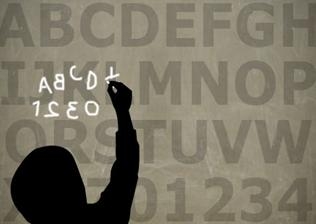Study: Dyslexia May Be Caused by Faulty Brain Connections
Posted by G. Thorpe
http://atlantablackstar.com/2013/12/09/study-causes-dyslexia/ (ขนาดไฟล์: 167)
Scientists believe that between 10 and 15 percent of the U.S. population suffers from dyslexia. This learning disability was formerly thought to be caused by difficultly in recognizing distinct language sounds. However, a new study has found that the cause of dyslexia is a fault in the brain wiring that occurs between the left and right sides.
A dyslexic person will often swap letters within words or words within a sentence, causing a reading, writing and comprehensive learning disability, even though that person may have normal or even above-normal intelligence.
Bart Boets, a professor of psychiatry at Belgium’s University of Leuven, recently conducted a study of 23 people with dyslexia and a control group of 22 without dyslexia. This study was also co-authored by experts at Switzerland’s ETH Zurich University, the University of Oxford, and the University College London.
This study was conducted using an advanced functional magnetic resonance imaging techniques (fMRI). The technique measured the unique pattern that sounds make in the test subject’s brain. Boet’s experiment showed that the quality of brain impressions were no different in either test groups.
The test revealed that both groups identified the sounds in the same way, but the group with dyslexia took approximately 50 percent longer to respond to them. This finding surprised Boets and other experts because it contradicted previous thoughts on what actually was causing the learning disability.
What the fMRI technique showed was impaired connections between the left and right auditory regions of the dyslexic subject’s brains. This auditory region, or Broca’s region, is where phonetic representations and higher level processing of phonological sounds takes place.
Sequences of four partial words were used on the test subjects, followed by a change in one of the vowels or consonants. The subjects would listen to sequences such as, da-da-da-da and then ba-ba-ba-ba. Then they were asked what had changed between the first and last sequence they heard.
One of the dyslexia researchers, Hans Op de Beeck, clarified the analysis used in the study to a simpler metaphorical situation. Op de Beeck described the scenario of his daughter calling from home using his landline telephone to say she was home from school. He would understand that she was home, but wouldn’t be able to know why she was at home or what she was currently doing at home.
ที่มา: http://atlantablackstar.com/2013/12/09/study-causes-dyslexia/ (ขนาดไฟล์: 167)
วันที่โพสต์: 26/01/2557 เวลา 02:55:48 
![]()
![]()
แสดงความคิดเห็น
รายละเอียดกระทู้
Study: Dyslexia May Be Caused by Faulty Brain Connections Posted by G. Thorpe http://atlantablackstar.com/2013/12/09/study-causes-dyslexia/ Scientists believe that between 10 and 15 percent of the U.S. population suffers from dyslexia. This learning disability was formerly thought to be caused by difficultly in recognizing distinct language sounds. However, a new study has found that the cause of dyslexia is a fault in the brain wiring that occurs between the left and right sides. A dyslexic person will often swap letters within words or words within a sentence, causing a reading, writing and comprehensive learning disability, even though that person may have normal or even above-normal intelligence. Bart Boets, a professor of psychiatry at Belgium’s University of Leuven, recently conducted a study of 23 people with dyslexia and a control group of 22 without dyslexia. This study was also co-authored by experts at Switzerland’s ETH Zurich University, the University of Oxford, and the University College London. This study was conducted using an advanced functional magnetic resonance imaging techniques (fMRI). The technique measured the unique pattern that sounds make in the test subject’s brain. Boet’s experiment showed that the quality of brain impressions were no different in either test groups. The test revealed that both groups identified the sounds in the same way, but the group with dyslexia took approximately 50 percent longer to respond to them. This finding surprised Boets and other experts because it contradicted previous thoughts on what actually was causing the learning disability. What the fMRI technique showed was impaired connections between the left and right auditory regions of the dyslexic subject’s brains. This auditory region, or Broca’s region, is where phonetic representations and higher level processing of phonological sounds takes place. Sequences of four partial words were used on the test subjects, followed by a change in one of the vowels or consonants. The subjects would listen to sequences such as, da-da-da-da and then ba-ba-ba-ba. Then they were asked what had changed between the first and last sequence they heard. One of the dyslexia researchers, Hans Op de Beeck, clarified the analysis used in the study to a simpler metaphorical situation. Op de Beeck described the scenario of his daughter calling from home using his landline telephone to say she was home from school. He would understand that she was home, but wouldn’t be able to know why she was at home or what she was currently doing at
จัดฟอร์แม็ตข้อความและมัลติมีเดีย
รายละเอียดการใส่ ลิงค์ รูปภาพ วิดีโอ เพลง (Soundcloud)


